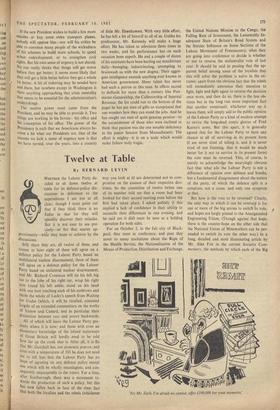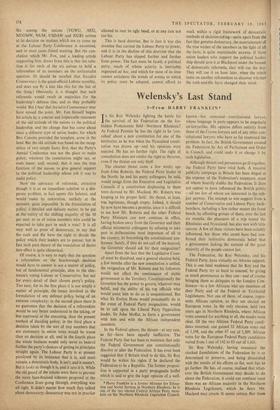Twelve at Table
By BERNARD LEVIN •
Still, there they are, all twelve of them, and sooner or later eight of them will agree on a defence policy for the Labour Party based on multilateral nuclear disarmament, three of them Will agree on a defence policy for the Labour Party based on unilateral nuclear disarmament, and Mr. Richard Crossman will tie his left big toe to the lobe of his right ear, wrap his right arm round his left ankle, stand on his head With one foot touching each of his eyebrows and recite the whole of Lucky's speech from Waiting for Godot (which, it will be recalled, consisted largely of an extended commentary on the works of Testew and Cunard, and in particular their distinction between esse and posse) backwards.
All of which will leave the Labour Party pre- cisely where it is now; and those with even an elementary knowledge of the inland waterways of Great Britain will hardly need to be told how far up the creek that is. After all, it is flu that Mr. Gaitskell has, not dementia prcecox, and even with a temperature of 103 he does not need Inc to tell him that the Labour Party has no hope of agreeing on any defence policy except one which will be wholly meaningless, and con- sequently unacceptable to the voters. For a time, after Scarborough, there was a movement to- wards the production of such a policy, but this has now fallen back in face of the clear fact that both the loyalists and the rebels (whichever
way you look at it) are determined not to com- promise on the essence of their respective doc- trines. So the committee of twelve (when one of its number told me that a room had been booked for their second meeting even before the first had taken place, I asked politely if this implied a lack of confidence in their ability to reconcile their differences in one evening, and he said yes it did) must be seen as a holding operation for both sides.
For on October 2, in the fair city of Black- pool, they meet in conference, and pass they never so many resolutions about the Rape of the Health Service, the Nationalisation of the Means of Production, Distribution and Exchange,
the United Nations Mission to the Congo, the Falling Rate of Investment, the Lamentably In- adequate State of Britain's Road System and the Sinister Influence on Some Sections of the Labour Movement of Freemasonry, what they are going into conference to decide is whether or not to reverse the unilateralist vote of last year. It should be said in passing that the ap- parent belief among some of the loyalists that this will solve the problem is naïve in the ex- treme; apart from the obvious fact that the rebels will immediately announce their intention to fight, fight and fight again to reverse the decision once more, and then do so, there is the less ob- vious but in the long run more important fact that another somersault, whichever way up it leaves them, will simply add to the public opinion of the Labour Party as a kind of modern attempt to revive the long-dead comic glories of Fred Karno's army. But this apart, it is generally agreed that for the Labour Party to have any chance at all of surviving in its present form (I am never tired of telling it, and it is never tired of not listening, that it would be much better for it not to survive in its present form) the vote must be reversed. This, of course, is merely to acknowledge the wearyingly obvious fact that what ails the Labour Party is not a difference of opinion over defence and bombs, but a fundamental disagreement about the nature of the party, of which the defence split is a symptom, not a cause, and only one symptom at that.
But how is the vote to be reversed? Clearly, the only way in which it can be reversed is for one or more of the big unions to switch its vote, .or and hopes are largly pinned to the Amalgamated Engineering Union. (Though against that hope, there is the counter-hope on the other side that the National Union of Mineworkers can be per- suaded to switch its vote the other way.) In a long, detailed and most illuminating article by Mr. Alan Fox in the current Socialist Com- mentary. the methods by which each of the Big 'No Mr. Zarb, I'm afraid we cannot offer £100,000 for your memoirs.' Six among the unions (TGWU, AEU, NUGMW, NUM, USDAW and NUR) arrives at its decision on matters which arc to come up at the Labour Party Conference is examined, and in most cases found wanting. But the con- clusion which Mr. Fox, and a leading article supporting him, draws from this is that the solu- tion is for each of the six unions to hold a referendum of its members on the unilateralist question. (It should be recalled that Socialist Commentary is the quasi-official Labour monthly, and does not fly a kite like this for the fun of the thing.) Obviously, it is thought that such referenda would result in majorities for the leadership's defence line, and so they probably would. But I fear that Socialist Commentary may have missed the point. Mr. Fox himself begins his article by a concise and impeccable statement of the old attitude of the unions to the political leadership, and the change that has come about since a different type of union leader, for which Bro. Cousins provided the template, arose in the land. But the old attitude was based on the recog- nition of two simple facts; first, that the Party's Annual Conference was not the place to make policy, whatever the constitution might say, or even mean; and, second, that it was the true function of the unions to give general support to the political leadership whose job it was to make policy.
Now the advocacy of referenda, attractive though it is as an immediate solution to a des- perate problem. in fact upsets this balance, and would make its restoration, unlikely at the moment. quite impossible. Is the formulation of policy, a detailed and delicate matter, to be put at the mercy of the shifting majority of the 10 per cent. or so of union members who could be expected to take part in such a vote? It is all very well to prate of democracy, to say that the rank and file have the right to decide the policy which their leaders are to pursue; but in fact such pure theory of the translation of desire into effect is quite chimerical.
Of course, it is easy to reply that the question a referendum on, the Scarborough decision would have to answer is not a matter of policy, but of fundamental principle, akin to the elec- torate's voting Labour or Conservative, but not for every detail of their chosen party's policy. Too easy; for in the first place it is not simply a matter of principle, the issues involved in the formulation of any defence policy being of an extreme complexity; in the second place there is no guarantee that the decision of a referendum would be any better understood in the taking, or less equivocal in the executing, than the present method of deciding policy; in the third place a decision taken by the sort of tiny numbers that are customary in union votes would be worse than no decision at all; and in the fourth place the whole business would only serve to bedevil further the party's chances of getting its principles straight again. The Labour Party is at present paralysed by its insistence that it is, and must remain, a democratic body. It isn't; and it mustn't. But it looks as though it is, and it says it is. While the old guard of the unions were there to prevent the more hare-brained schemes proposed at the Conference from going through, everything was all right. It didn't matter how much they talked about democracy; democracy was not in practice allowed to rear its ugly head, or at any rate not too far.
This is hard doctrine. But in fact it was this doctrine that carried the Labour Party to power, and it is in the decline of this doctrine that the Labour Party has slipped further and further from power. The fact must be faced; a political party, much of whose activity is inevitably organised ad hoc, and which for most of its time cannot anticipate the trends of events to which its policy must be adapted, cannot afford to work within a rigid framework of democratic methods of decision-taking—quite apart from the fact that genuine democracy, the ascertainment of the true wishes of the members in the light of all the facts, is quite unattainable anyway. If those union leaders who support the political leader- ship should save it at Blackpool under the banner of democratic referenda, they will rue the day. They will rue it an hour later, when the rebels insist on another referendum to discover whether the rank-and-file have changed their mind.











































 Previous page
Previous page